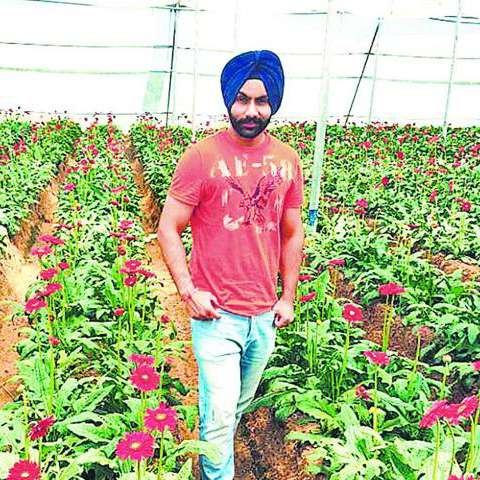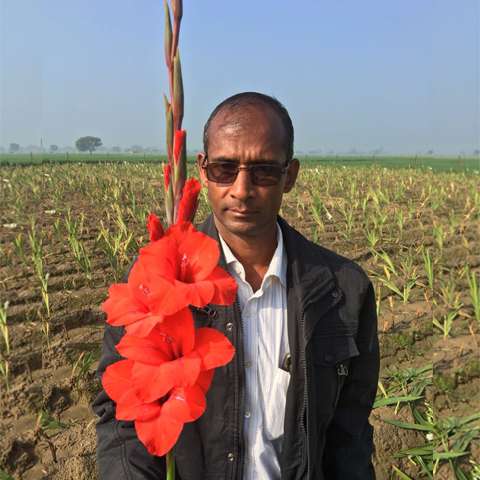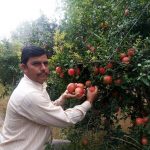Meet Next Generation’s Flourishing Farmer Who Is Fostering Local Employment in Uttar Pradesh
View of Nanil Chaudhary’s farm will blow away anyone in the dreamy aromatic world… Well, you must be wondering what other than crop, cows, buffalo, dirt, and dung will be seen there? Then you guys are mistaken, because Nanil Chaudhary is a booming floriculturist from Aligarh district of Uttar Pradesh, and in his farm, you are only going to find colourful flowers of Gerbera, Rajnigandha, Gladiolus, and many more.
Coming from a conventional farming background, the farming journey of Nanil Chaudhary started like other farmers with the cultivation of Wheat, Bajra, Potato, Barley, and Mustard till 2014-15. Although he started like a conventional farmer, he never let his mind confined in those stereotypical thinking, and in the year 2015-2016, he entered the field of floriculture.
Nanil Chaudhary came to know about the Gerbera plantation in poly-house near Iglas tehsil in Aligarh district. After making some inquiries he came to know that large land holding is required to establish it. Since, his mother, Smt. Krishna Kumari holds large land holding, so in her name, the project was sanctioned; and this is how the Krishna Biotech was established.
“For the establishment of climatically controlled poly-houses, I invested around 1.10 crores out of which 75 lakhs were financed by RBL Bank Ltd and this was a great help for me.”
Aiming towards generating employment to improve the rural economy, he moved towards floriculture and today he has his own climatically controlled two poly-houses where he has planted around 40,000 plants of Gerbera in 2 acres; outside the poly-houses he has planted Gladiolus in 6 acres, Rajnigandha in 6 acres, Brassica in 1 acres and Chrysanthemum in 3 acres.
And how these flowers are turning the business of Nanil Chaudhary into riches:
One Gerbera plant gives 25 flowers a year which ultimately turns the production number around 1000000 flowers, and when these number of flowers are sold at the rate of Rs. 2.50 the income is Rs. 20 lakhs a year. After deducting all the expenditures there is a net profit of 6-7 lakhs per year to Nanil Chaudhary. This profit is only from the Gerbera flower, other than this Rajnigandha gives profit around Rs. 2 lakhs per acre, Gladiolus around Rs. 1.50 lakhs per acre and Chrysanthemum gives profit around Rs. 3.00 lakhs per acre.
“Excluding expenditure of labour charges, bank instalments and other input costs, this floriculture business is giving me profit around 14 lakhs per year.”
Marketing was a bit difficult in the beginning for Nanil Chaudhary, as it was difficult to deliver flowers to Delhi, but later, in 2017-18, Uttar Pradesh State Roadways Buses were the best means through which flower marketing was done mostly.
Few people who were always there standing like supporting pillars for Nanil Chaudhary throughout his floriculture journey are his mother, Dr. Mam Chand Singh (Scientist and Head of Protected Cultivation Division at IARI, PUSA, New Delhi), and Shri Kaushal Kumar (District Horticulture Officer, Aligarh).
Knowledge diffusion is the most important thing in which Nanil Chaudhary always believes and has expanded floriculture to various farmers in Etah, Hathras, Meerut and Ghaziabad districts of Uttar Pradesh.
Currently, Nanil Chaudhary’s farm is equipped with a force of 20-22 skilled workers, who make the working of the farm totally mechanized with the help of modern equipment like specially designed planter, drip irrigation system, solar power irrigation pump and much more.
In future Nanil Chaudhary has few sets of plans:
• Planning to explore the possibility of extracting essential oil from Rajnigandha,
• Expand floriculture in Uttaranchal on a larger scale
• Venture into large-scale production of Gladiolus bulbs, Rajnigandha bulbs and Chrysanthemum nursery for commercial cultivation
By venturing in floriculture, Nanil Chaudhary has observed a big change in his area, people get regular income due to the cultivation, harvesting, packing, and transportation of flowers, income of those people shows the real happiness on their faces…Concludes Nanil Chaudhary
For putting tremendous efforts in floriculture field, Nanil Chaudhary has been honoured with –
• Received Progressive Farmer Award by the Divisional Commissioner, Aligarh in 2016-17
• A documentary was also prepared on Krishna Biotech Farm, by the Doordarshan, Delhi and telecasted in Krishi Darshan Programme on 22 November 2016
• Later in the year 2017-18, another documentary was prepared by the Doordarshan and telecasted on DD Krishi Darshan on 27 December 2017
Floriculture expanded through Krishna Biotech farm with the determination and hard work of Nanil Chaudhary has attracted remunerative prices leading to set a quality standard for his family and the people living around.








